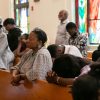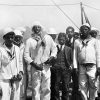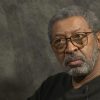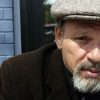Part II. The birth and coming-into-being of Nat Turner (October 2, 1800) was surely a bad omen for the oppressor but a sign and wonder for the oppressed. But even though Nat Turner is born in the midst of the severe, savage and inhuman oppression, which we rightly call the Holocaust of enslavement, and he is seen and treated as special by his parents and his people, he must himself come into consciousness of his and their oppression, of the radical evil and injustice of the enslavement, and decide to resist.
He began at an early age sensing he had a special and divine mission of liberation. Thus, he began preparing for it. In his narrative of struggle, he tells us the people believed and told him, “I surely would be a prophet”. And “my father and mother strengthened me in this….saying in my presence I was intended for some great purpose”. Likewise he reports that both Blacks and Whites had said of him “that I had too much sense to be raised (trained as a salve) and if I was, I would never be of any use to anyone as a slave”.
Moreover, he relates that his mind was “restless, inquisitive and observant of everything that was passing” not just religious things, but the whole of life as it confronted and challenged him and his people. Continuing, he tells us that he even read, when possible and was constantly, “reflecting on many things that would present themselves to my imagination”. And finally, he informs us that much of his time “was spent either in prayer or in making experiments in casting different things in mould made of earth, in attempting to make paper, gun powder and many other experiments”. Nat turner, then, is not a man who one day spontaneously rebelled, but a man with a sense of mission, i.e., to do the great work of freedom and who, having discovered his mission, prepared himself to fulfill it in terms of self-preparation, self-determination, sacrifice and life-and-death struggle.
He is audaciously self-authorizing and self-determining in relation to his oppressor and oppression. He reports that before he began the armed struggle, he felt he needed to be baptized but that the Whites would not give permission. So, he says, he gathered a group and “We went to the water together in the sight of many who reviled us and (we) were baptized by the spirit”. Thus, he teaches a liberating religion, not needing White authority or the consent or cooperation of the unconscious enslaved ones. He needs no permission and assistance from the serpent of oppression. His real and relevant relationship is with the Divine and it is the divine spirit which baptizes him and those who dare and practice freedom.
Nat Turner, even by the account of his fake lawyer, does not act from “motives of revenge or sudden anger, but the results of long deliberation and a settled purpose of mind”. That is to say, his mind was focused and stayed on freedom, every step and stop along the road he was opening toward freedom. Even in the midst of the armed struggle, he found the men too lax and began to drill them as the soldiers they were. And when he was captured and was being questioned, he showed the same unbreakable will and dedication to freedom.
Thus, when he was asked that given he was eventually captured “didn’t he think he was wrong to rise up in rebellion like this”? He simply answered “No, wasn’t Christ crucified?” In other words, he seems to be asking “aren’t women and men often martyred in the pursuit of a righteous cause by their oppressors?” And ‘is not crucifixion in the fight for freedom and justice to be expected from the rulers of ancient and modern Rome.” Moreover, he seems to be asking how could he, called by the Divine who heard the cries and saw the suffering of his enslaved and oppressed people, turn a blind eye to injustice and a deaf ear to truth and to the Divine call for righteous and relentless resistance?
For Nat Turner, his mission of liberation of his people was clear. He reported he saw “signs in the heavens that it would be made known to me when I should commence this great work” of liberation. And seeing signs culminating with the eclipse of the sun, he read it as a definitive sign, he says, that “I should rise and prepare myself and slay my enemies with their own weapons”. Like the people of Haiti and all guerillas since, his first weapon was his will to be free and free his people. The others he and his fellow combatants took from the oppressor or made out of work tools now turned to more liberating use. And with the righteous will to be free, what things or acts can’t be turned into a weapon to defeat our oppressor—from education to unity, and from revolutionary organization and love of our people to the personal practice of liberation on every level of life.
He reaffirms the rightfulness and responsibleness of his rebellion against a radically diabolical system, the Holocaust of enslavement. And by using Jesus’ sacrifice for redemption of humanity as an instructive model of religious reference and ethical responsibility, he could have also been raising other similar questions. As I read it, his brief answer in the form of a question might also have been to ask his interrogator, “Is my capture and death a sign of a mistake or a martyrdom that testifies to my willingness to give my life in the struggle for the liberation of my people?” And is it a mistake or the fulfillment of a divinely assigned mission to sacrifice myself in the cause of my people’s freedom to leave a legacy of righteous and relentless resistance?
Indeed, Nat Turner did leave an uplifting and eternal legacy and Black people sang songs of praise for his fearlessness, his sacrifice, his fight for freedom and his undying spirit of righteous and relentless struggle. Thus, they sang songs defying and discrediting the rich and powerful oppressor and raising up in praise the practice of Nat Turner, Fire Prophet and Freedom Fighter. They sang, “You might be rich as cream/ and drive you a coach and four horse team./ But you can’t keep the world from movin’ round nor Nat Turner from gaining ground./ And your name, it might be Caesar for sure./ And you got you a cannot that can shoot a mile or more./ But you can’t keep the world from movin’ round/ Nor Nat Turner from gainin’ ground”. And how can we best sing his struggle song and advance his legacy except in the continuing struggle for and practice of freedom.
It was always our understanding as Simba in the Sixties, Young Lions, who walked in the way of the ancestors—as we expressed in Ebonics—freedom ain’t free; liberation don’t come without costs and our righteous struggle cannot succeed without serious and sustained sacrifice. It is a message of our martyrs, way-makers and soldiers who will not walk away from the battlefield until victory is won, Nat Turners who won’t be stopped from gaining ground and challenges us be committed to liberation in the same or similar righteously resistant ways..
Dr. Maulana Karenga, Professor and Chair of Africana Studies, California State University-Long Beach; Executive Director, African American Cultural Center (Us); Creator of Kwanzaa; and author of Kwanzaa: A Celebration of Family, Community and Culture and Essays on Struggle: Position and Analysis, www.AfricanAmericanCulturalCenter-LA.org; www.OfficialKwanzaaWebsite.org; www.MaulanaKarenga.org.
11-16-15















